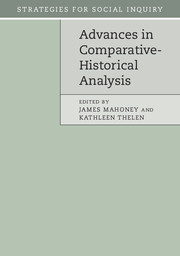Book contents
- Frontmatter
- Contents
- List of figures
- List of tables
- List of contributors
- Preface
- Part I Introduction
- Part II Agenda-setting work
- Part III Tools for temporal analysis
- 5 Power and path dependence
- 6 Critical junctures and institutional change
- 7 Drift and conversion: hidden faces of institutional change
- Part IV Issues of method
- Epilogue: comparative-historical analysis: past, present, future
- Index
- References
5 - Power and path dependence
from Part III - Tools for temporal analysis
Published online by Cambridge University Press: 05 July 2015
- Frontmatter
- Contents
- List of figures
- List of tables
- List of contributors
- Preface
- Part I Introduction
- Part II Agenda-setting work
- Part III Tools for temporal analysis
- 5 Power and path dependence
- 6 Critical junctures and institutional change
- 7 Drift and conversion: hidden faces of institutional change
- Part IV Issues of method
- Epilogue: comparative-historical analysis: past, present, future
- Index
- References
Summary
A decade after a pointed critique of the discipline's retreat from the study of power (Moe 2005), evidence of a “power-free political science” is more widespread than ever. At least as it is practiced in the field of American politics – which plays a leading role in shaping the contours of the discipline as a whole – power and influence remain elusive, unhelpful, and marginalized concepts. When Americanists have gone looking for “power” – decisive political advantages for those with more resources – they mostly haven't found it. There is very little evidence showing that campaign contributions or lobbying systematically effect roll call votes in Congress (Schlozman, Verba, and Brady 2012). Stephen Ansolabehere, John de Figueiredo, and James Snyder provocatively asked, “Why is there so little money in American politics?” They found that although this was partly because donating raised big collective action problems, it was equally because money seemed to make little difference to electoral outcomes (Ansolabehere, de Figueiredo, and Snyder 2003). A broad and sophisticated study of lobbying from some of the leading scholars of interest groups recently reported that it could “find virtually no linkage between [group] resources and outcomes” (Baumgartner et al. 2009). Of course, the inability to find power in empirical research is especially puzzling given the extraordinary increase in economic inequality in the United States over the past generation.
Nor is the elusiveness of power just an empirical matter. More fundamentally, power doesn't really fit in the leading frameworks for studying American politics. These frameworks typically depict politics as fluid or “plastic.” Elections follow a Downsian logic; this cycle's loser adjusts and becomes the next cycle's winner. Take out incumbency, David Mayhew observes, and presidential elections over the past century or so have been essentially a coin toss between the two parties (Mayhew 2002). Legislatures are under the sway of Arrow's paradox of voting so that losers in any legislative struggle are well positioned to cycle back into the winner's position.
Information
- Type
- Chapter
- Information
- Advances in Comparative-Historical Analysis , pp. 123 - 146Publisher: Cambridge University PressPrint publication year: 2015
References
Accessibility standard: Unknown
Why this information is here
This section outlines the accessibility features of this content - including support for screen readers, full keyboard navigation and high-contrast display options. This may not be relevant for you.Accessibility Information
- 73
- Cited by
